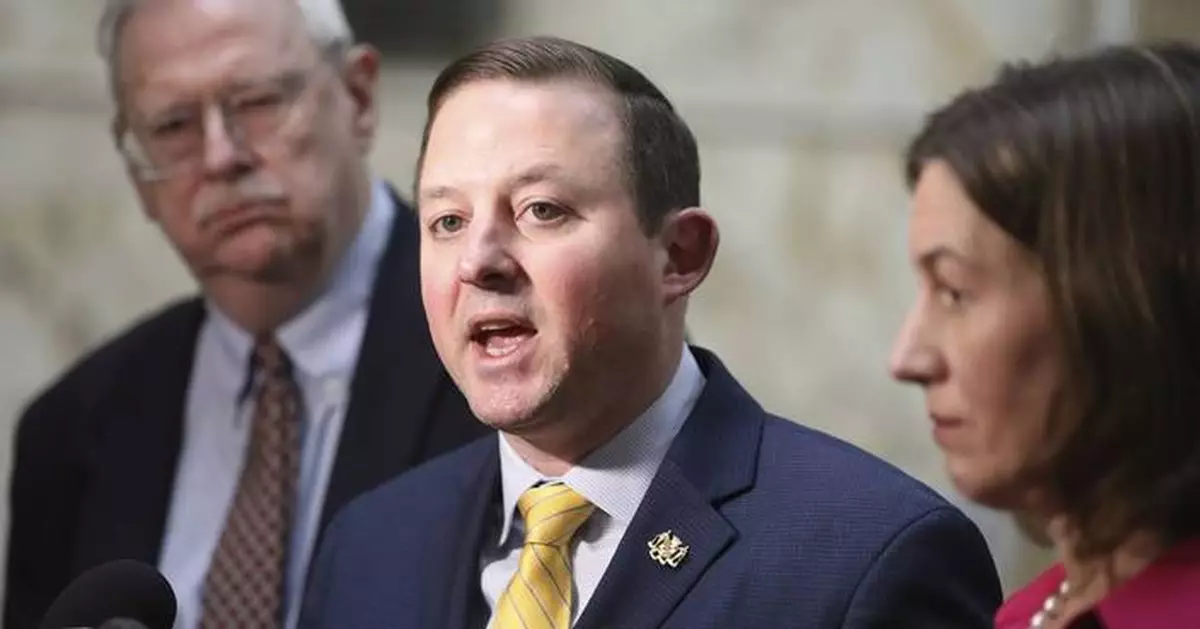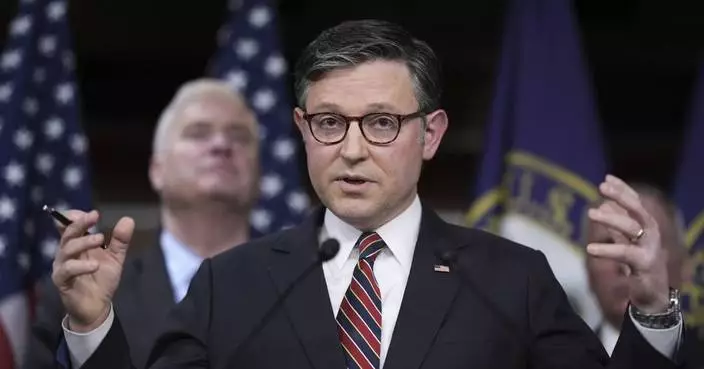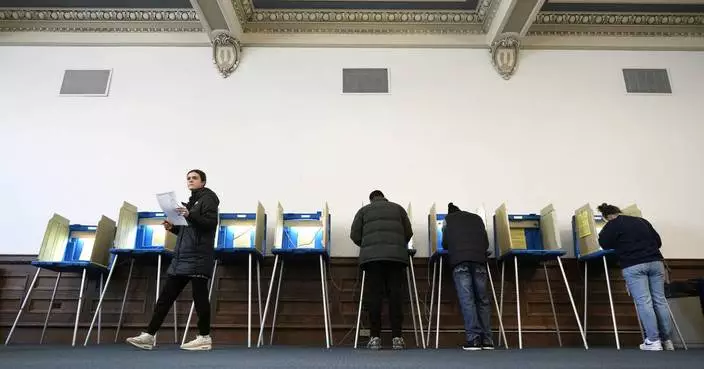ANNAPOLIS, Md. (AP) — Maryland lawmakers ended their legislative session late Monday in a challenging budget year that was aggravated by uncertainties with the Trump administration’s downsizing of the federal government on a state that relies heavily on federal jobs and contracts.
Democratic Gov. Wes Moore and lawmakers addressed a $3.3 billion deficit by making cuts throughout state government and raising taxes and fees.
Lawmakers also announced they were forming a panel to monitor federal actions and provide updates to legislators to prepare them to respond to decisions in the nation’s capital 30 miles (48 kilometers) away.
“From public education, to health care, and our federal workforce, we have already witnessed how recent federal actions threaten the economic stability of our state," Maryland House Speaker Adrienne Jones, a Democrat, said. "We know these threats will continue after the General Assembly’s 2025 legislative session adjourns.”
Moore also noted concerns about continuing challenges that the heavily Democratic state faces from actions taken by the Trump administration, from federal job cuts to tariffs.
The governor described the Maryland revenue increases as tax reform that spares the middle class and brings tax cuts for many, while asking more of high-income residents. He said the state budget reductions were “the largest amount of cuts that you've seen in a Maryland state budget in 16 years.”
“We are continuing to deliver for the people of the state, particularly at a time when we're seeing so much chaos coming from Washington, D.C.,” Moore told reporters Monday.
Senate President Bill Ferguson said that from the beginning of the session in January, “the theme that really resonated the most was fear and uncertainty.”
“What's happened at the federal level has been truly unpredictable at every turn,” said Ferguson, a Baltimore Democrat.
Republicans, who are outnumbered in both the House and Senate, have repeatedly noted that Maryland has been facing a big deficit since before Trump regained the White House in January. They criticized the tax increases and fees, noting a variety of them relate to vehicles and will affect anyone who drives.
“We could have done it differently,” said Del. Jesse Pippy, a Republican and the House minority whip who said the budget could have been balanced without tax increases. “I think the taxpayers would have appreciated a different course of action.”
Here is a look at some of the highlights of legislation lawmakers have sent to the governor's desk:
Lawmakers closed a big budget deficit with cuts throughout state government and tax increases.
The budget includes a new 3% tax on information technology services. It also includes two new tax brackets for high-income residents, one for people who make over $500,000 annually and another for those with more than $1 million in annual income.
There also is a new 2% tax on capital gains for people with income over $350,000, as well as tax hikes on recreational cannabis and sports wagering.
Budget legislation includes about $1.6 billion in revenues, along with roughly $2 billion in spending reductions. The state would still have about $2.1 billion in its rainy day fund and a fund balance of more than $300 million.
Lawmakers passed a package of measures aimed at addressing energy needs, including initiatives to generate more power from nuclear, natural gas, solar and battery storage. It also includes a small rebate on state ratepayers’ electric bills, with two installments adding up to an average of about $80.
The Maryland Department of Health would have access to $25 million for an abortion grant program to help providers pay costs for the uninsured. The money comes from part of the federal Affordable Care Act that has collected fees from insurers to pay for abortion services for their policyholders.
Lawmakers approved a measure to make permanent a program that provides subsidies to help young adults get affordable health insurance.
A state board would have its authority expanded to set upper price limits for prescription drugs statewide, instead of only for state and local governments.
People convicted of a crime between the ages of 18 and 25 who have served 20 years or more of a prison sentence would be able to petition for a reduction in sentence if they have not been sentenced to life without the possibility of parole or are a sex offender. The bill does not apply to offenders convicted of killing first responders.
Many more state residents would be able to expunge criminal records after completing their sentences. The measure also will require the state to automatically shield records from public view for roughly 175,000 people who were pardoned by the governor last year for minor cannabis convictions.
A statewide commission would study and recommend potential reparations for slavery and the lingering effects of racial discrimination.
Future liabilities from claims of sexual abuse at state and private institutions would be limited with caps on settlements from $890,000 to $400,000 for cases filed after May 31 for state institutions and from $1.5 million to $700,000 for private institutions.
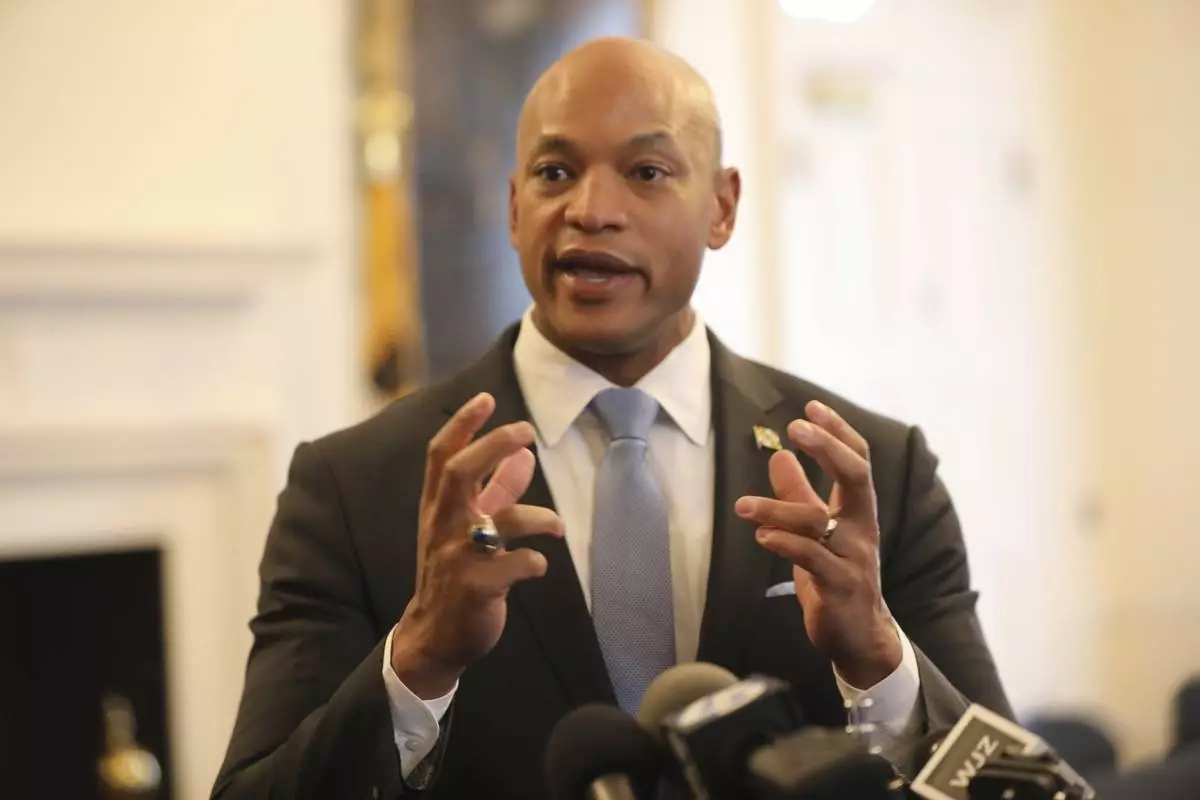
Maryland Gov. Wes Moore, a Democrat, takes questions from reporters on the last day of Maryland's legislative session on Monday, April 7, 2025, in Annapolis, Md. (AP Photo/Brian Witte)
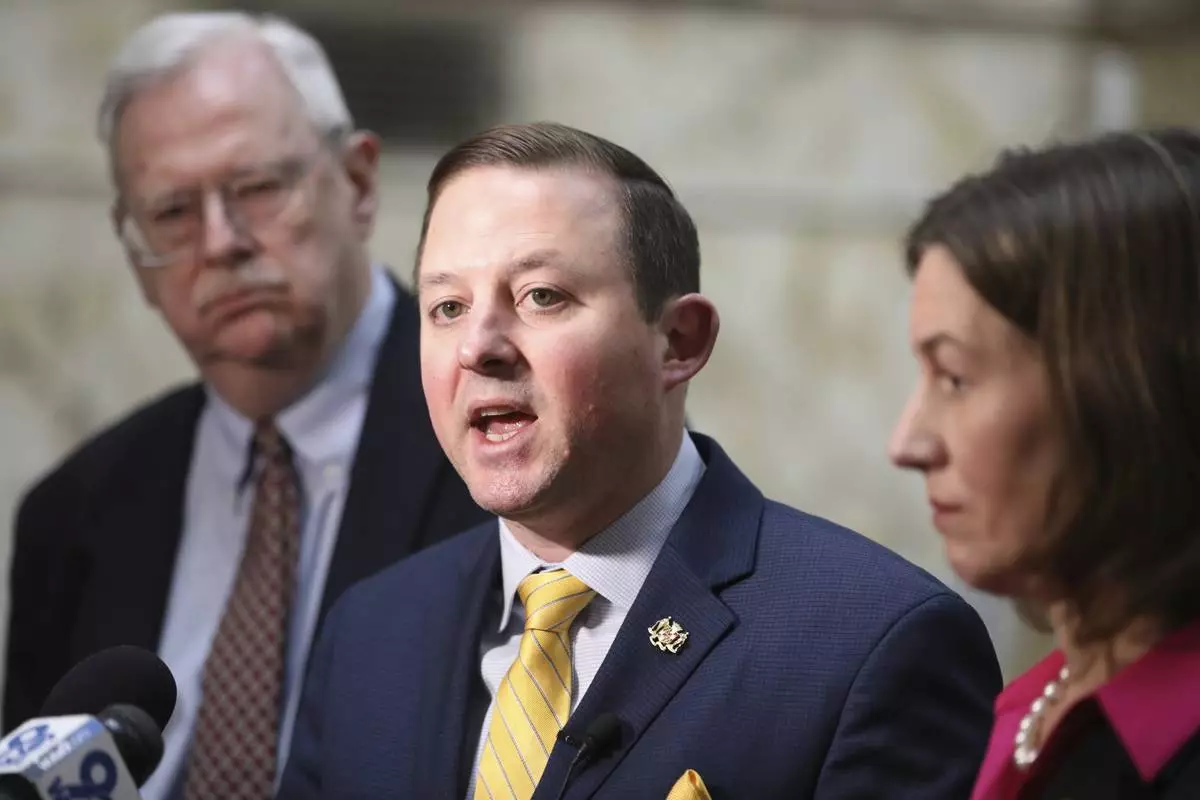
Maryland Senate President Bill Ferguson takes questions from reporters on the last day of Maryland's legislative session Monday, April 7, 2025, in Annapolis, Md. (AP Photo/Brian Witte)
House Republicans narrowly approved their budget framework on Thursday, a political turnaround after Speaker Mike Johnson worked into the night to satisfy GOP holdouts who had refused to advance trillions of dollars in tax breaks without deeper spending cuts.
U.S. stocks are giving back some of their historic gains from the day before as Wall Street weighs a global trade war that has cooled in temperature but is still threatening the economy.
The S&P 500 was down 2.3% early Thursday, a day after surging 9.5% following President Donald Trump ’s decision to pause many of his tariffs worldwide. The Dow Jones Industrial Average was down 685 points, and the Nasdaq composite was down 2.9%.
Here's the latest:
U.S. egg prices increased in March to reach a record high of $6.23 per dozen, even with a drop in wholesale prices and no egg farms having bird flu outbreaks.
Agriculture Secretary Brooke Rollins on Thursday suggested the rise in egg prices will be temporary, however. She pointed to the Consumer Price Index more broadly showing a slight dip for goods and services cost across the U.S. economy in March.
“We’re also moving into the Super Bowl of eggs, which is Easter,” Rollins said. “So from the beginning, I’ve said this is sort of the high price for retail for eggs, but we feel very confident that will continue to come back down.”
An email was sent by human resources this week, stating: “Masks should not be worn in public spaces in the Kennedy Center. This is especially important for our public-facing staff and front of house employees.”
A staff member, speaking on condition of anonymity for fear of retribution, confirmed the change in policy. The staffer at the Washington-based performing arts center said they were concerned for people who might need masks for health reasons.
On Thursday, a page on health and safety on the center’s website was no longer available. The page used to state: “Masks are optional in all Kennedy Center spaces for visitors and staff. If you prefer to wear a mask, you are welcome to do so.”
— Associated Press writer Ashraf Khalil contributed to this report from Washington.
When Trump said Wednesday that Chinese imports would be tariffed at 125%, that wasn’t completely accurate.
His post on Truth Social had excluded the 20% tariffs that the U.S. president put on China for its role in the production of fentanyl. The White House said Thursday once that figure is added in that the new tariffs total 145%.
Previous statements by administration officials had emphasized the 125% rate.
House Republicans passed one of their signature issues for the year on Thursday, approving legislation to require proof of U.S. citizenship when registering to vote for federal elections, one of President Donald Trump’s top election-related priorities.
Democrats lined up against the bill and warned that it risks disenfranchising millions of Americans who do not have ready access to the proper documents.
Trump has long signaled a desire to change how elections are run in the U.S. and last month issued a sweeping executive order that included a citizenship requirement, among other election-related changes.
Top Republicans have argued the legislation, known as the Safeguard American Voter Eligibility Act, is necessary to ensure only citizens vote in U.S. elections and “cements into law” Trump’s order.
This marks Republicans’ second attempt at passing the SAVE Act. It passed the House last year but failed in the Senate amid Democratic opposition.
A Trump administration official said Trump will sign a bill into law today that overturns the Biden Administration’s “Broker Rule,” which requires digital asset brokers to report certain decentralized financial — or DeFi — transactions to the IRS.
The move rolls back the regulation that was set to take effect on the crypto industry in 2027. It is Trump’s first crypto regulation signing since taking office in January.
Republicans have railed against the rule, arguing that it is unworkable since DeFi platforms operate on blockchains without human intervention and the rule stifles innovation in the crypto space, threatening to push digital asset innovation overseas.
House Republicans narrowly approved their budget framework on Thursday, a political turnaround after Speaker Mike Johnson worked into the night to satisfy GOP holdouts who had refused to advance trillions of dollars in tax breaks without deeper spending cuts.
Johnson stood with Senate Majority Leader John Thune early in the morning at the Capitol and said Trump’s “big, beautiful bill,” which seeks as much as $1.5 trillion in cuts to federal programs and services, was on track. The speaker had abruptly halted voting Wednesday night.
“I believe we have the votes,” said Johnson, R-La. “We’ll take the next big step.”
Thune, R-S.D., also tried to assure House conservatives that many GOP senators are aligned with their pursuit of spending reductions.
“We certainly are going to do everything we can,” Thune said.
The 216-214 vote pushed the budget plan forward, one more milestone for Johnson, who could only lose a few detractors from his slim Republican majority.
The second highest-ranking official at the federal Bureau of Alcohol, Tobacco, Firearms and Explosives has been pushed out by the Trump administration, a person familiar with the matter told The Associated Press.
Marvin Richardson, who has served since 2019 as deputy director of the agency responsible for enforcing U.S. gun laws, has decided to retire after being told Wednesday evening to either leave or be fired, the person said. They spoke on the condition of anonymity to discuss a personnel matter.
Richardson didn’t immediately respond to an email on Thursday. A Justice Department official declined to comment.
It comes amid intense upheaval at the agency that’s long been a target of conservatives.
On Wednesday, ATF senior leaders were informed that Kash Patel, the FBI director who also had been serving as acting ATF chief, had been replaced by Army Secretary Daniel Driscoll.
— Associated Press writer Alanna Durkin Richer contributed to this report from Washington.
Speaker Mike Johnson is meeting with holdouts before a key vote that’s necessary for Republicans to extend tax cuts and boost border security spending later this year without any help from Democrats.
The holdouts are seeking greater assurances that Republicans will deliver significant spending cuts to go along with extending the individual and estate tax cuts that expire at the end of this year.
Rep. Tim Burchett, R-Tenn., said the only commitments so far are verbal. “I’d like to see something in writing,” Burchett said.
Rep. Eric Burlison, R-Mo., said he’s still uncommitted going into the meeting, and was looking for “a little bit more solid assurance” on spending cuts.
Rep. Andy Harris, chairman of the ultraconservative House Freedom Caucus, struck an optimistic tone going into the meeting. “I think there is progress being made,” Harris said.
Ryan Routh will be charged with attempted first-degree murder and terrorism, Florida Attorney General James Uthmeier said on Thursday.
Prosecutors say Routh methodically plotted to kill Trump at Trump’s West Palm Beach golf course last September. Routh allegedly aimed his rifle at a Secret Service agent, who opened fire and prompted him to drop his weapon and flee without firing.
The Secret Service had spotted Routh before Trump came into view at the golf course.
This entry has been updated to reflect that Routh will be charged with attempted first-degree murder, not first-degree murder.
Senate Democrats are asking for the U.S. Office of Government Ethics to look into whether anyone benefited financially from advanced knowledge of Trump’s decision to back down on tariffs to most countries on Wednesday.
The Republican president said on social media on Wednesday morning that it was a “great time to buy,” then announced less than four hours later that nearly all tariffs would be paused for 90 days. It caused the stock market to soar.
Democratic Sens. Adam Schiff of California and Ruben Gallego of Arizona released a letter this morning to White House Chief of Staff Susie Wiles and Jamieson Greer, the acting director of the ethics office, asking for “an urgent inquiry into whether President Trump, his family, or other members of the administration engaged in insider trading or other illegal financial transactions.”
While Democrats don’t have power to force the investigation, they are hoping the demands direct scrutiny at the issue.
China on Thursday said it will “appropriately reduce the number of imported U.S. films,” as the tariff war has escalated between the world’s two largest economies.
A spokesperson for the China Film Administration said it is “inevitable” that Chinese audiences would find American films less palatable given the “wrong move by the U.S. to wantonly implement tariffs on China.”
The spokesperson said China would follow market rules and respect the preferences of China’s moviegoers to reduce the import of American films. Chinese authorities have long controlled the distribution of foreign films, limiting them to a set quota each year.
China and the U.S. are the world’s two largest film markets by box office revenue.
Unveiled Thursday by the White House Historical Association, the ornament features the red china plate of former President Ronald Reagan’s administration on one side and the gold-rimmed china plate of former President Bill Clinton’s on the other.
First issued in 1981, the ornament usually honors presidents in their order of service; last year’s was a tribute to former President Jimmy Carter.
But Stewart McLaurin, the association’s president, says it sometimes is used to highlight important White House anniversaries or occasions.
President Ulysses Grant held the first state dinner in December 1874 for King David Kalakaua, one of the last monarchs of the Hawaiian Kingdom.
Bessent will travel to Buenos Aires on Monday to meet with President Javier Milei and Minister of Economy Luis Caputo to show support for Argentina’s “bold economic reforms,” the Treasury Department said in a statement.
Trump’s recent sweeping tariff package included 10% on Argentina, though on Wednesday he announced a 90-day pause on the tariffs for most countries except China — whose tariffs he raised to 125%.
A Treasury news release states that during his meetings in Argentina, Bessent will “reiterate the United States’ firm backing for the continued implementation of President Milei’s robust economic agenda and encourage the international community to fully support President Milei’s economic reform efforts.”
“I look forward to our positive discussions about Argentina’s economy, and to exploring the ways our nations can further deepen our vital economic relationship,” Bessent said.
U.S. stocks are giving back some of their historic gains from the day before as Wall Street weighs a global trade war that has cooled in temperature but is still threatening the economy.
The S&P 500 was down 2.3% early Thursday, a day after surging 9.5% following Trump’s decision to pause many of his tariffs worldwide. The Dow Jones Industrial Average was down 685 points, and the Nasdaq composite was down 2.9%.
Even a better-than-expected report on inflation wasn’t enough to get stocks to add to their gains from the day before, including the S&P 500’s third-best since 1940.
David Bisbee, the interim head of the U.S. mission to the World Trade Organization, insisted the United States was “taking action it considers necessary for the protection of its essential security interests” — a move he said was allowed under the trade body’s rules.
Bisbee on Thursday told a WTO gathering that Trump had taken steps to address an “emergency” caused by persistent annual U.S. goods trade deficits, which the envoy said topped $1 trillion each of the past two years.
The U.S. diplomatic mission in Geneva provided The Associated Press with a copy of Bisbee’s comments during a closed-door WTO session.
On Wednesday — before Trump announced a suspension of nearly all of the tariffs against trading partners, except for China — a Chinese government representative accused the United States of setting the global trading system “ablaze” with the tariffs.
“This will give us the opportunity to negotiate the reduction of tariffs so that the playing field is leveled,” said Lesotho Minister of Trade and Industry Mokhethi Shelile.
Lesotho, which relies on making and exporting clothes to the U.S. for brands like Levi’s, had feared almost half its clothing sector could be put out of business.
In Madagascar, which provides 80% of the world’s vanilla, exporters said there was now more time for government and industry officials to meet and plot a way forward.
And South Africa Trade and Industry Minister Parks Tau said on Radio 702 that while his country received confirmation that proposed export tariffs by the U.S. were paused, the 10% baseline tariff meant “it is not completely off.”
South Africa is one of more than 30 countries eligible for tariff-free access to the American market under the African Growth and Opportunity Act agreement that has been in place for 25 years. Many of them fear that Trump’s tariff tactics will mean the agreement will not be renewed.
Trump’s top economic advisers will gather a day after the president announced he was suspending for 90 days import taxes on dozens of countries while escalating his trade war with China to discuss the president’s options moving forward.
“The chief of staff’s office has called all the principals who have, you know, skin in the game and discuss their views about how this should go,” Kevin Hassett, director of the White House National Economic Council, told reporters on Thursday.
Hassett added that 15 countries have already presented offers to the administration aimed at getting Trump to drop his reciprocal tariffs. He did not detail which countries have presented offers.
This morning, at 10 a.m. ET, Trump will receive his intelligence briefing in the Oval Office.
At 11 a.m., he will participate in a cabinet meeting.
At 12:30 p.m., he will attend the swearing-in ceremony for the solicitor general.
Later, at 4 p.m., he will participate in a bill signing in the Oval Office, according to the White House.
World markets soared on Thursday, with Japan’s benchmark jumping more than 9% as investors welcomed Trump’s decision to put his latest tariff hikes on hold for 90 days.
In early trading, Germany’s DAX initially gained more than 8%. By midmorning, they were up 5.3% at 20,720.86, while France’s CAC 40 in Paris gained 5% to 7,204.23. Britain’s FTSE 100 surged 4.0% to 7,983.37.
Chinese shares saw more moderate gains, given yet another jump in the tariffs each side is imposing on each other’s exports.
The future for the S&P 500 was down 2.1%, while the contract for the Dow Jones Industrial Average dropped 1.6%.
Analysts had expected the global comeback, given that U.S. stocks had one of their best days in history on Wednesday as investors registered their relief over Trump’s decision.
▶ Read more about the global markets
China is reaching out to other nations as the U.S. layers on more tariffs in what appears to be an attempt to form a united front to compel Washington to retreat. Days into the effort, it’s meeting only partial success with many countries unwilling to ally with the main target of Trump’s trade war.
China has thus far focused on Europe, with a phone call between Premier Li Qiang and European Commission President Ursula von der Leyen “sending a positive message to the outside world.”
That was followed by a video conference between Chinese Commerce Minister Wang Wentao and EU Commissioner for Trade and Economic Security Šefčović on Tuesday to discuss the U.S. “reciprocal tariffs.”
Wang has also spoken with the 10-member Association of Southeast Asian Nations, while Li, the premier, has met with business leaders. China has “already made a full evaluation and is prepared to deal with all kinds of uncertainties, and will introduce incremental policies according to the needs of the situation,” Xinhua News Agency quoted Li as saying.
▶ Read more about China’s response to Trump’s tariffs
Trump delivered another jarring reversal in American trade policy Wednesday, suspending for 90 days import taxes he’d imposed barely 13 hours earlier on dozens of countries while escalating his trade war with China. The moves triggered a powerful stock market rally on Wall Street but left businesses, investors and America’s trading partners bewildered about what the president is attempting to achieve.
The U-turn came after the sweeping global tariffs Trump announced last week set off a four-day rout in global financial markets, paralyzed businesses and raised fears the U.S. and world economies would tumble into recession.
White House press secretary Karoline Leavitt tried to characterize the sudden change in policy as part of a grand negotiating strategy. But to those outside the Trump administration, it looked like a cave-in to market pressure and to growing fears that the president’s impetuous use of import taxes — tariffs — would cause massive collateral economic damage.
▶ Read more about Trump’s reversal on most tariffs
The European Union’s executive commission said Thursday it will put its retaliatory measures against new U.S. tariffs on hold for 90 days to match President Donald Trump’s pause on his sweeping new tariffs and leave room for a negotiated solution.
European Commission President Ursula von der Leyen said that the commission, which handles trade for the 27 member countries, “took note of the announcement by President Trump.”
New tariffs on 20.9 billion euros ($23 billion) of US goods will be put on hold for 90 days because “we want to give negotiations a chance,” she said in a statement.
But she warned: “If negotiations are not satisfactory, our countermeasures will kick in.”
Trump imposed a 20% levy on goods from the EU as part of his onslaught of tariffs against global trading partners but has said he will pause them for 90 days to give countries a chance to negotiate solutions to U.S. trade concerns.
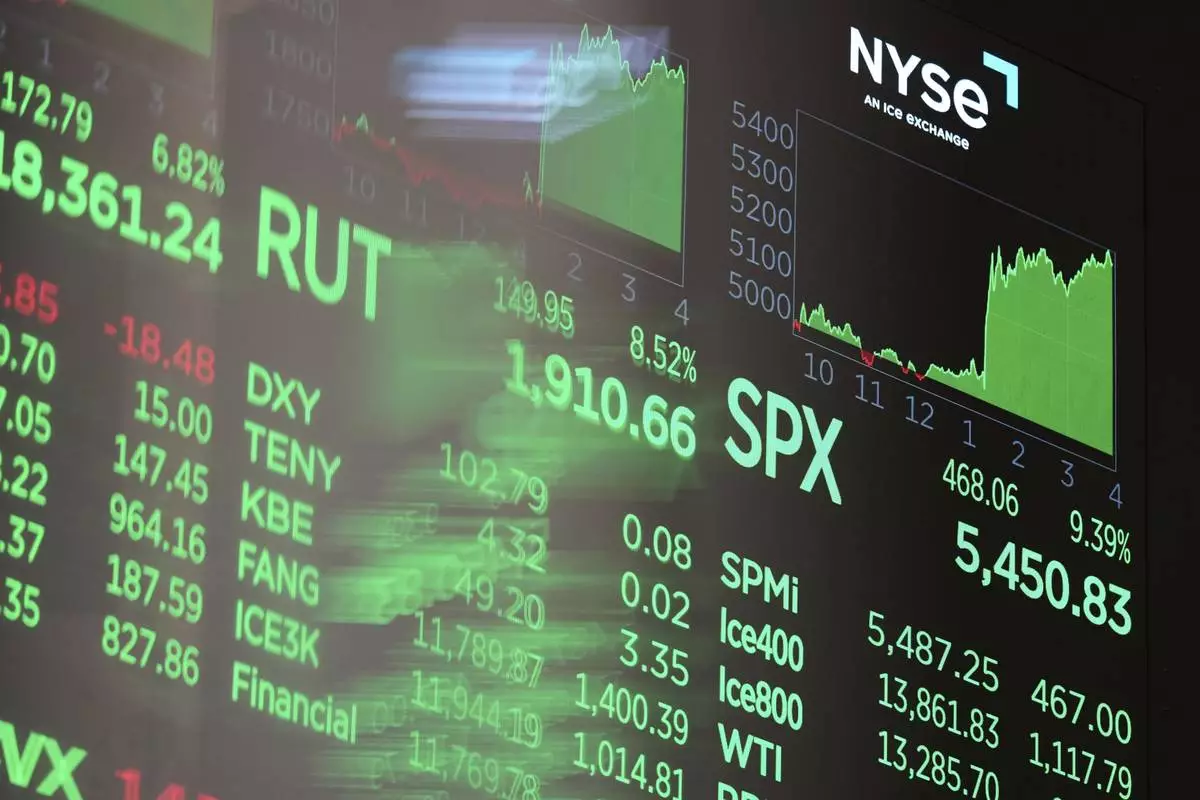
An electronic screen displays financial information on the floor at the New York Stock Exchange in New York, Wednesday, April 9, 2025. (AP Photo/Seth Wenig)
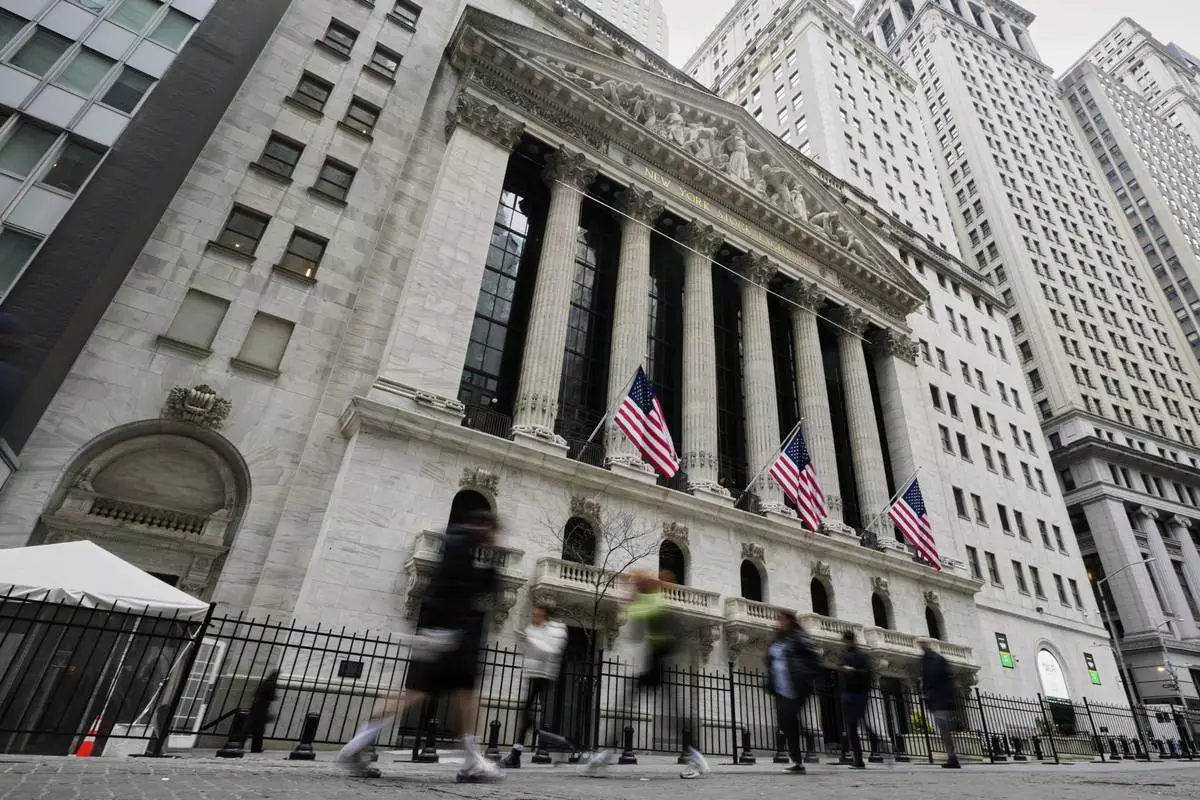
People walk by the New York Stock Exchange, Thursday morning, April 10, 2025. (AP Photo/Richard Drew)
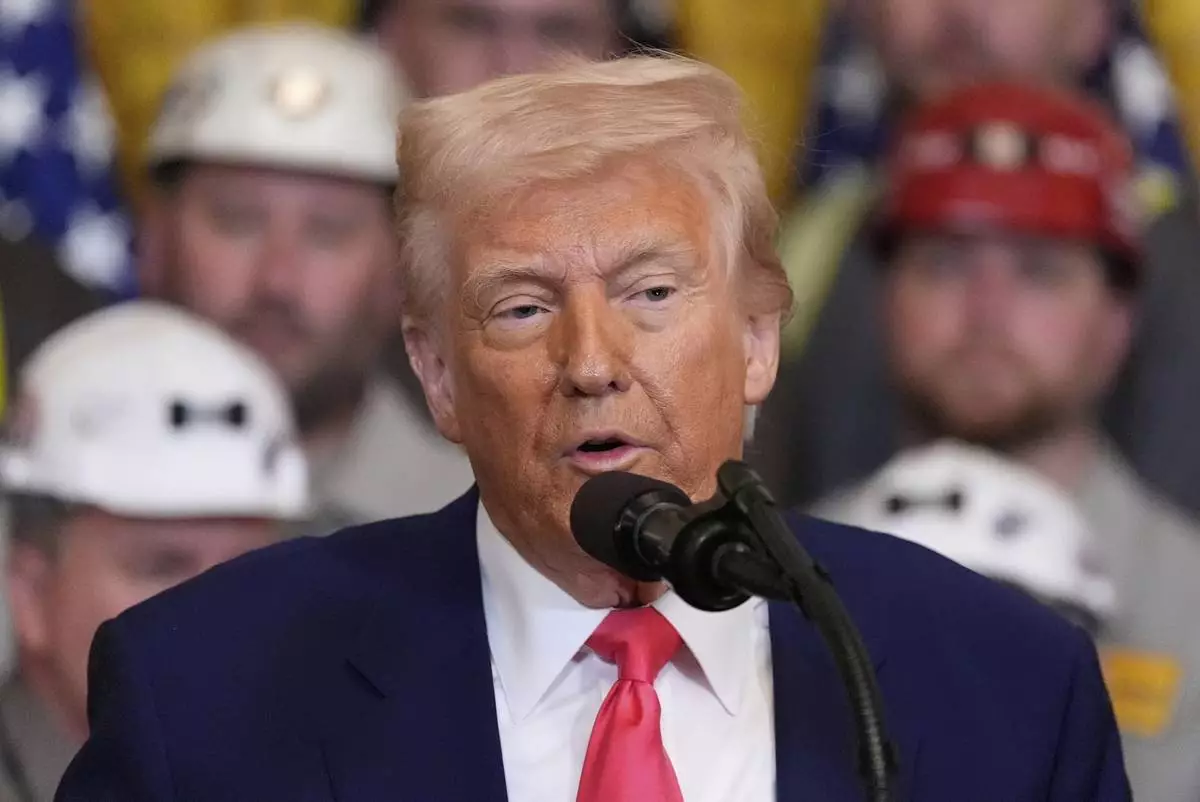
President Donald Trump speaks during an event on energy production in the East Room of the White House, Tuesday, April 8, 2025, in Washington. (AP Photo/Alex Brandon)
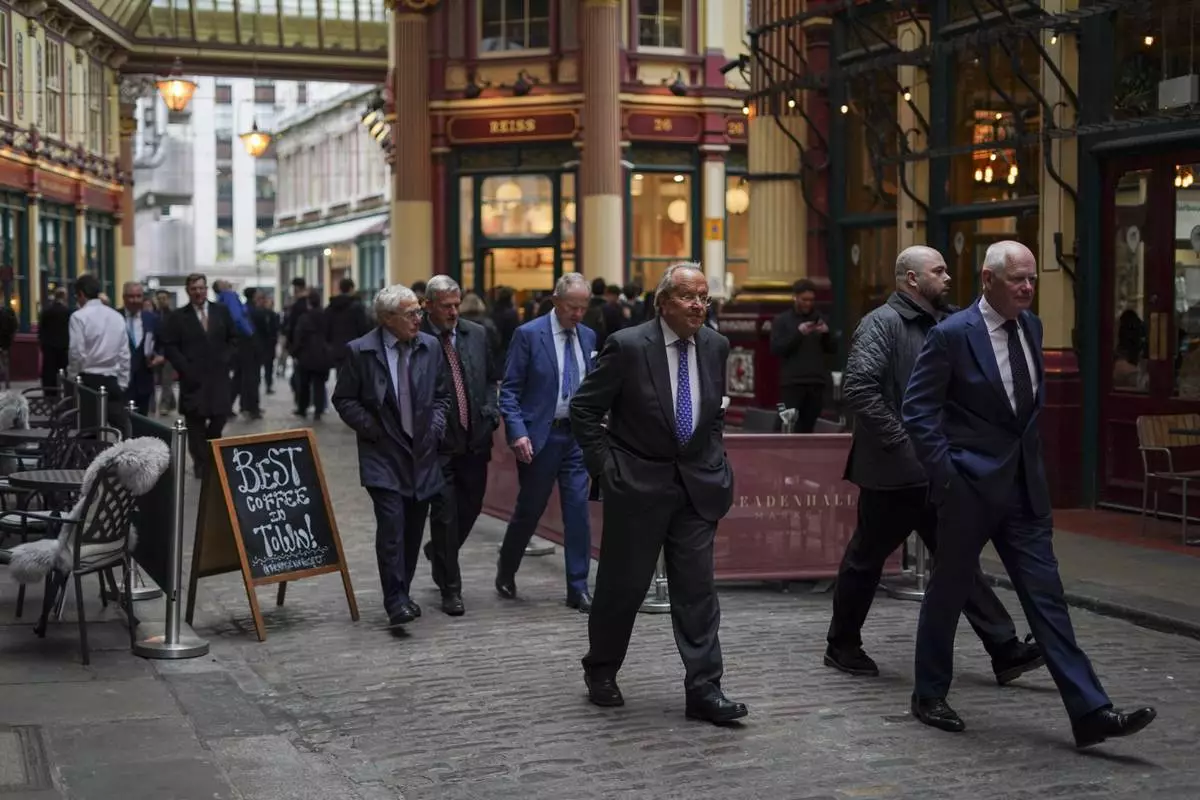
People walk in Leadenhall Market at lunch time, in the financial district, known as The City in London, Wednesday, April 9, 2025. (AP Photo/Alberto Pezzali)
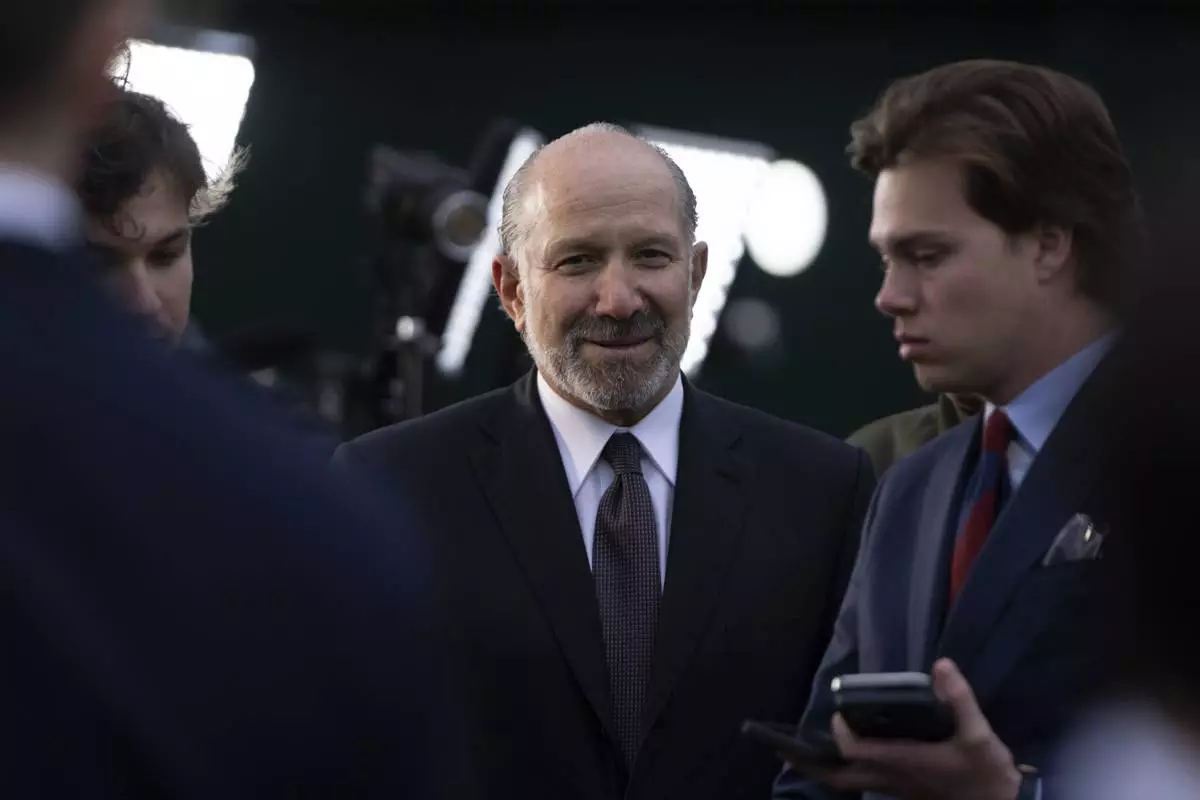
Commerce Secretary Howard Lutnick leaves after doing a television interview outside the White House, Wednesday, April 2, 2025, in Washington. (AP Photo/Mark Schiefelbein)
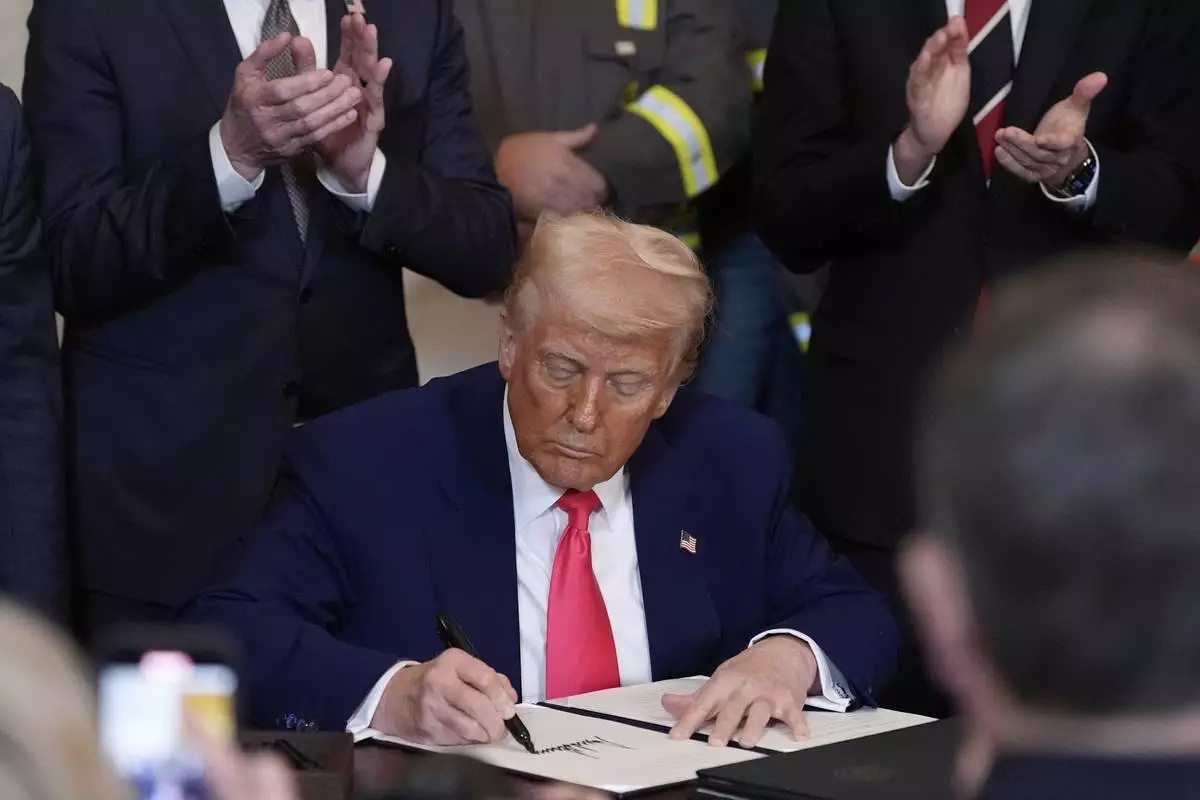
President Donald Trump signs an executive order during an event in the East Room of the White House, Tuesday, April 8, 2025, in Washington. (AP Photo/Alex Brandon)




